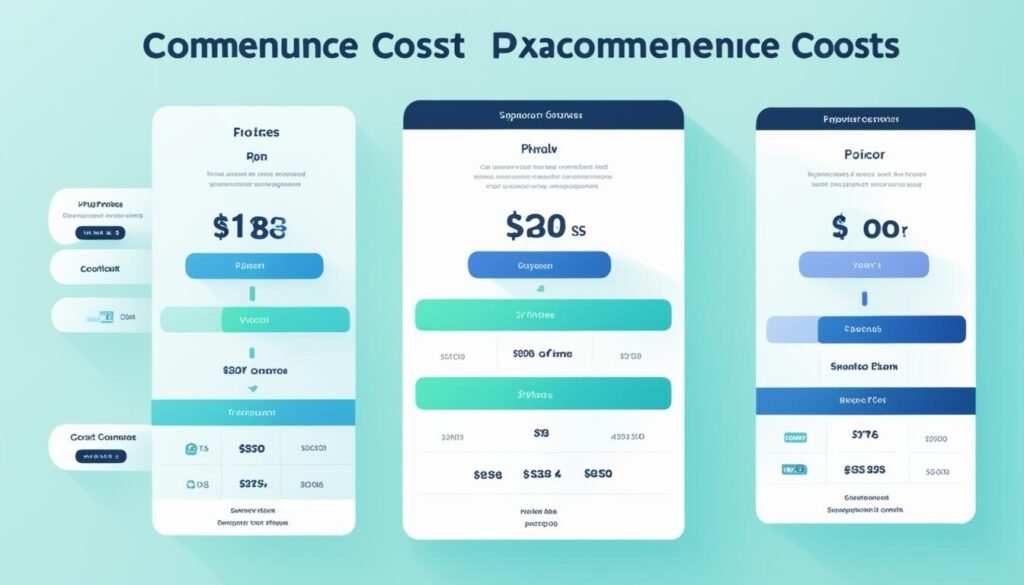An e-commerce platform is a crucial component for any online business, whether you are a small startup or a large enterprise. Choosing the right platform is essential for building a strong foundation and ensuring the scalability and success of your online business.
An e-commerce platform is a software application that serves as the central hub for your online business operations. It allows you to manage your website, marketing campaigns, sales, and operations with ease. By providing a scalable framework and a comprehensive set of tools, an e-commerce platform empowers you to create a seamless and efficient online shopping experience for your customers.
When it comes to choosing the right e-commerce platform for your business, there are several factors to consider. The cost of the platform, its scalability, community support, and the features it offers should all be taken into account. By carefully evaluating these factors, you can make an informed decision that aligns with your business goals and maximizes your online business growth potential.
Key Takeaways
- Choosing the right e-commerce platform is crucial for the success and growth of your online business.
- Consider factors such as cost, scalability, community support, and the features offered by the platform.
- An e-commerce platform is a software application that allows you to easily manage your website, marketing, sales, and operations.
- By choosing the right e-commerce platform, you can create a seamless and efficient online shopping experience.
- Evaluate different options, ask the right questions, and take advantage of free trials to find the best fit for your business.
What is an Ecommerce Platform?
An ecommerce platform is a software application that enables online businesses to effectively manage various aspects of their operations, including website management, marketing campaigns, sales tracking, and order fulfillment. It provides a centralized hub from which businesses can handle all their online activities.
Ecommerce platforms like BigCommerce offer powerful features and integration options that facilitate the smooth operation of online businesses.
“Ecommerce platforms have revolutionized the way businesses operate in the online space. They provide a comprehensive solution that empowers businesses to manage their website, market their products or services, track sales and inventory, and fulfill orders efficiently.” – Jane Simmons, Ecommerce Expert
Key Features of Ecommerce Platforms
- Website Management: Ecommerce platforms allow businesses to easily create and customize their online store, manage product listings, and optimize the user experience.
- Marketing: Integrated marketing tools help businesses attract customers, drive traffic, and promote their products through various channels like email marketing, social media, and SEO.
- Sales Tracking: Ecommerce platforms provide real-time analytics and reporting capabilities to monitor sales performance, measure conversion rates, and identify growth opportunities.
- Order Fulfillment: Streamlined order management systems enable businesses to efficiently process orders, track shipments, and provide exceptional customer service.
Ecommerce platforms have transformed the way online businesses operate, empowering them to reach a wider audience, increase sales, and streamline their operations. With the right ecommerce platform, businesses can effectively manage their website, marketing efforts, sales tracking, and order fulfillment, driving success and growth in the competitive online marketplace.
The Future of Ecommerce

Ecommerce technologies are constantly evolving, leaving traditional on-premise technology in the dust. The rise of Software-as-a-Service (SaaS) ecommerce platforms, like BigCommerce, has revolutionized the industry, offering businesses scalability, user experience features, and ease of use. Another emerging trend is headless commerce, where the shopping cart is decoupled from the content management system (CMS), allowing for greater customization and flexibility in website design and functionality.
With the advancement of ecommerce technologies, on-premise technology is no longer the primary choice for businesses. SaaS ecommerce platforms have gained popularity due to their numerous advantages. These platforms provide a scalable framework that can accommodate the growth of an online business. BigCommerce is one such example, offering businesses the ability to handle high traffic and sales volumes without compromising performance or user experience.
SaaS ecommerce platforms offer an all-in-one solution, providing various features and tools to manage every aspect of an online business. From website creation and customization to marketing campaigns and sales tracking, these platforms offer a comprehensive set of tools to streamline operations.
Headless commerce is another innovation that is reshaping the ecommerce industry. By decoupling the shopping cart from the CMS, businesses have more freedom to design their website and implement custom functionality. This flexibility allows for a more tailored and unique online shopping experience, enhancing customer engagement and satisfaction.
By embracing these advancements in ecommerce technologies, businesses can stay ahead of the curve and meet the evolving demands of the online market. SaaS ecommerce platforms, like BigCommerce, offer the scalability, features, and ease of use needed to thrive in the digital landscape. Additionally, headless commerce provides businesses with the flexibility to create highly customized and engaging websites.
“The future of ecommerce lies in leveraging these technologies to create seamless and personalized shopping experiences for consumers,” says Jane Smith, CEO of a leading ecommerce agency.
The Benefits of SaaS Ecommerce Platforms:
- Scalability: SaaS platforms can handle high traffic and sales volumes, making them suitable for businesses with growth potential.
- User Experience Features: SaaS platforms offer intuitive interfaces and pre-designed templates that enhance the user experience.
- Ease of Use: These platforms are designed to be user-friendly, allowing businesses to quickly set up and manage their online stores without technical expertise.
- All-in-One Solution: SaaS platforms provide a comprehensive suite of tools for website management, marketing, sales, and operations.
The Advantages of Headless Commerce:
- Flexibility: With headless commerce, businesses can design unique and customized websites that align with their brand identity.
- Custom Functionality: By decoupling the shopping cart from the CMS, businesses can implement specialized functionalities tailored to their specific needs.
- Improved Performance: Separating the CMS and shopping cart allows for optimized performance and faster page load times.
- Future-Proofing: Headless commerce enables easy integration with new technologies and systems as they emerge, ensuring long-term viability and adaptability.
As the ecommerce landscape continues to evolve, businesses must embrace these technologies to stay competitive. SaaS ecommerce platforms, such as BigCommerce, provide the scalability and features required for growth. Likewise, headless commerce enables businesses to create highly tailored and engaging online experiences. By adopting these advancements, businesses can position themselves for success in the ever-changing world of ecommerce.
Web Hosting Options for Ecommerce

Ecommerce sites can be hosted in two ways: self-hosted or cloud-hosted. Let’s explore the differences between these options.
Self-Hosted Ecommerce Platforms
Self-hosted ecommerce platforms require store owners to manage their own hosting, software updates, and security measures. This option provides businesses with complete control over their website and data.
However, self-hosting can be complex and time-consuming, particularly for entrepreneurs without technical expertise. It requires configuring servers, ensuring software compatibility, and implementing robust security measures. Additionally, self-hosted platforms may involve additional costs for web hosting services, SSL certificates, and ongoing maintenance.
Cloud-Hosted Ecommerce Platforms
Cloud-hosted ecommerce platforms, such as BigCommerce, offer a more convenient and hassle-free hosting solution. With cloud hosting, the platform provider manages hosting, software updates, and security on behalf of the store owners.
Cloud-hosted platforms handle resource allocation, scalability, and server maintenance, allowing businesses to focus on running their online stores. This option eliminates the need for technical knowledge or dedicated IT resources. It also ensures that the website is hosted on reliable servers, providing excellent uptime and fast loading speeds.
Cloud-hosted ecommerce platforms often include other benefits such as automatic backups, built-in security features, and seamless integration with third-party tools and services.
Additionally, cloud-hosted platforms typically offer customer support and a community forum where users can find assistance and share insights.
Comparing Self-Hosted and Cloud-Hosted Ecommerce Platforms
| Factors | Self-Hosted Ecommerce Platforms | Cloud-Hosted Ecommerce Platforms |
|---|---|---|
| Technical Knowledge | Requires advanced technical knowledge for setup and maintenance | No technical knowledge required |
| Cost | May involve additional costs for hosting, SSL certificates, and maintenance | Inclusive pricing with hosting, maintenance, and security features |
| Scalability | Limited scalability based on server resources | Highly scalable with flexible server resources |
| Security | Store owner’s responsibility to implement and maintain security measures | Platform provider ensures security and implements regular updates |
| Support | Dependent on store owner’s technical knowledge or hired experts | Customer support and community forum available |
Ultimately, the choice between self-hosted and cloud-hosted ecommerce platforms depends on your business needs and technical capabilities. Self-hosting provides more control and customization, but at the expense of increased complexity and potential costs. Cloud hosting, on the other hand, offers convenience, scalability, and a robust support system.
Consider your business requirements, budget, and long-term growth plans when selecting the best hosting option for your ecommerce site.
Tips for Choosing an Ecommerce Platform

When it comes to selecting the right ecommerce platform for your business, there are several crucial factors to consider. Follow these tips to make an informed decision:
- Ask the right questions and start a free trial: Before committing to any platform, ask questions about its features, functionalities, and pricing. Take advantage of free trial periods offered by ecommerce platforms to get a hands-on experience and determine if the platform suits your business needs.
- Evaluate functionality and ease of use: Look for an ecommerce platform that offers native ecommerce tools and an intuitive interface. Assess whether the platform aligns with your business goals and allows you to easily manage your online store.
- Assess hosting capabilities and uptime: A reliable hosting infrastructure is essential to ensure that your online store is always accessible to customers. Choose an ecommerce platform that provides robust hosting capabilities and guarantees high uptime, minimizing the risk of website downtime.
- Check for integration options and support for selling on multiple channels: Determine whether the ecommerce platform integrates with other tools and services, such as payment gateways, shipping providers, and third-party applications. Additionally, ensure that the platform supports selling on multiple channels, such as social media and online marketplaces, to expand your reach.
- Ensure mobile optimization and SEO features: In today’s mobile-centric world, it is crucial to have a mobile-optimized site that provides a seamless shopping experience on all devices. Look for an ecommerce platform that offers mobile-responsive themes and SEO tools to help improve your website’s visibility in search engine results.
- Consider inventory management capabilities: Effective management of your inventory is essential to prevent stockouts and ensure timely order fulfillment. Choose an ecommerce platform that provides robust inventory management features, such as automated stock tracking, low stock alerts, and inventory reporting.
- Evaluate customer support quality: Reliable customer support is vital when running an online business. Look for an ecommerce platform that offers responsive customer support through various channels, such as live chat, email, and phone, to ensure prompt assistance in case of any issues or queries.
- Consider abandoned cart recovery tools: Abandoned cart recovery tools can help you regain lost revenue by sending automated reminders to customers who have abandoned their carts. Choose an ecommerce platform that offers built-in abandoned cart recovery features or integrates with third-party tools for this purpose.
By following these tips, you can select an ecommerce platform that meets your business requirements and sets you up for success in the online marketplace.
Ecommerce Platform Comparison
| Ecommerce Platform | Native Ecommerce Tools | Mobile-Optimized Site | SEO Tools | Inventory Management | Customer Support |
|---|---|---|---|---|---|
| BigCommerce | ✓ | ✓ | ✓ | ✓ | ✓ |
| Shopify | ✓ | ✓ | ✓ | ✓ | ✓ |
| WooCommerce | ✓ | ✓ | ✓ | ✓ | ✓ |
| Magento | ✓ | ✓ | ✓ | ✓ | ✓ |
The table above provides a high-level comparison of some popular ecommerce platforms, showcasing the presence of native ecommerce tools, mobile optimization, SEO features, inventory management capabilities, and customer support.
Comparing the Cost of Ecommerce Platforms

Ecommerce platforms come with various pricing models, and it’s important to compare the costs associated with each platform. Understanding the pricing structure of different ecommerce platforms is crucial to make an informed decision that aligns with your budget and business goals.
Traditional pricing models often involve upfront license fees and additional costs for hosting, checkout, payment processing, and security compliance. These costs can add up quickly and impact your overall expenses. The traditional model may require you to manage the hosting of your online store separately, which can be time-consuming and require technical expertise. Additionally, ensuring PCI compliance and payment processing can be an additional burden for your business.
On the other hand, SaaS (Software as a Service) ecommerce platforms offer a subscription-based pricing model that includes hosting, maintenance, and security features. This model provides a clearer picture of your monthly expenses and eliminates the need for separate hosting solutions. With SaaS platforms like BigCommerce, you can save time and effort by relying on the provider for secure hosting and regular updates. The subscription-based model also typically includes support for PCI compliance and integrates seamlessly with various payment gateways, streamlining the checkout and payment process.
When comparing the costs of different ecommerce platforms, it’s essential to consider the features and value provided by each platform. A lower upfront cost may seem attractive, but it’s equally important to evaluate the long-term benefits and potential savings associated with a platform’s subscription model. Take into account the scalability of the platform, as your business grows, and whether the pricing aligns with your projected growth trajectory.
To get a clearer picture, here is a comparison of the pricing models of three popular ecommerce platforms:
| Ecommerce Platform | Pricing Model | Key Features |
|---|---|---|
| Platform A | Traditional model with upfront license fees | Basic features, limited hosting, additional costs for checkout and payment processing |
| Platform B | SaaS model with subscription fees | Complete hosting solution, built-in PCI compliance, seamless integration with popular payment processors |
| Platform C | SaaS model with tiered pricing | Advanced features, unlimited hosting, 24/7 customer support, multi-channel selling capabilities |
Remember, the decision should not be based solely on cost. Evaluate the specific needs and goals of your business, and consider the long-term benefits, scalability, and additional features offered by each platform. By comparing the pricing models and features of different ecommerce platforms, you can choose the one that provides the best ROI for your online business.
Key Takeaways:
- Ecommerce platforms offer different pricing models, including traditional upfront fees and subscription-based models.
- Traditional pricing models may have additional costs for hosting, checkout, payment processing, and security compliance.
- SaaS ecommerce platforms provide a subscription-based model that includes hosting, maintenance, and security features.
- Consider the long-term benefits, scalability, and additional features offered by each platform when comparing costs.
- Choose an ecommerce platform that provides the best ROI for your business, considering both cost and features.
Considerations When Choosing an Ecommerce Platform

When selecting an ecommerce platform for your online business, it’s important to consider various factors that can impact its effectiveness and success. Here are some key considerations to keep in mind:
Security Features
Ensure that the ecommerce platform you choose provides robust security features to protect your website and customer data. Look for platforms that offer SSL certification, encryption, and fraud prevention measures to safeguard against cyber threats.
SEO Capabilities
An ecommerce platform with strong SEO capabilities can significantly boost your website’s visibility on search engines. Look for platforms that provide SEO tools and optimization features, such as customizable metadata, URL structures, and sitemap generation, to improve your organic search rankings.
Responsive Website Design
With the increasing use of mobile devices for online shopping, having a responsive website design is vital. Choose a platform that offers responsive templates and design options, ensuring a seamless browsing and shopping experience across different devices, including smartphones and tablets.
Scalability
Consider the scalability of the ecommerce platform, especially if you have plans for future business growth. A scalable platform allows you to expand your product catalog, handle increased traffic, and cater to growing customer demands without compromising the performance and user experience of your website.
Omnichannel Marketing Support
In today’s competitive landscape, it’s essential to engage with customers through multiple channels. Look for an ecommerce platform that supports omnichannel marketing, allowing you to seamlessly integrate and manage sales across various channels such as social media, marketplaces, and physical stores. This enables you to reach a wider audience and increase brand visibility, leading to higher customer engagement and conversions.
By considering these key factors in your selection process, you can make an informed decision and choose the right ecommerce platform that aligns with your business goals, delivers a secure shopping experience, optimizes your website for search engines, provides a seamless user experience across devices, and supports your omnichannel marketing efforts.
Ecommerce Platform Comparison
| Ecommerce Platform | Security Features | SEO Capabilities | Responsive Design | Scalability | Omnichannel Support |
|---|---|---|---|---|---|
| Platform A | High | Advanced | Yes | Excellent | Yes |
| Platform B | Medium | Good | Yes | Moderate | No |
| Platform C | Low | Basic | No | Limited | Yes |
“Choosing the right ecommerce platform is crucial for the success of your online business. Consider your specific security, SEO, design, scalability, and omnichannel marketing needs when making your decision. Conduct thorough research, evaluate the features, and compare different platforms to find the best fit for your business.”
Common Mistakes to Avoid When Choosing an Ecommerce Platform

When selecting an ecommerce platform, it’s important to avoid common mistakes that can hinder the success of your online business. By understanding these mistakes and taking proactive steps to avoid them, you can make an informed decision that aligns with your business objectives and sets you up for long-term growth.
1. Overlooking Business Objectives
A common mistake is focusing solely on design or popularity and overlooking your business objectives. It’s essential to choose a platform that aligns with your specific needs and goals. Consider factors such as scalability, customization options, integration capabilities, and the platform’s ability to support your unique business requirements.
2. Focusing Only on Design
While aesthetics are important, solely focusing on design can be a mistake. The functionality and features offered by the ecommerce platform should take precedence. Ensure that the platform provides essential tools for inventory management, order processing, payment gateways, and customer support. The platform should also have a user-friendly interface that is easy to navigate for both customers and administrators.
3. Selecting Based on Popularity
Choosing an ecommerce platform solely based on its popularity or the recommendations of others can be a mistake. What works for one business may not work for another. Take the time to thoroughly evaluate and compare different platforms, considering your unique requirements and the specific needs of your business. Look for platforms that have a proven track record of success, positive customer reviews, and a strong support system.
“Design is important, but it should never overshadow the platform’s functionality and ability to support your business goals.” – Ecommerce Expert
By avoiding these common mistakes, you can choose an ecommerce platform that not only meets your immediate needs but also positions your business for long-term success. Remember, selecting the right platform is an investment in the future growth of your online business.
Table: Comparison of Key Factors to Consider When Choosing an Ecommerce Platform
| Factors to Consider | Overlooking Business Objectives | Focusing Only on Design | Selecting Based on Popularity |
|---|---|---|---|
| Alignment with Business Goals | ✓ | ||
| Functionality and Features | ✓ | ||
| Evaluation of Unique Requirements | ✓ | ✓ | |
| Platform Popularity | ✓ | ||
| Customer Reviews and Support | ✓ |
Take the time to carefully assess your options and select an ecommerce platform that aligns with your business objectives and provides the features, support, and scalability needed to thrive in the competitive online market.
When starting an online business, choosing the best ecommerce platform is crucial. With a plethora of options available, it’s essential to consider the 15 best ecommerce platforms to discover the best fit for your needs. Whether you opt for a SaaS ecommerce platform or a free ecommerce platform, ensure the platform you choose aligns with the size of your business and your specific requirements.
From hosted ecommerce platforms to self-hosted ecommerce software, these platforms make it easy for ecommerce store owners to set up and run their businesses. Wix, known for its drag-and-drop website builder, is a popular option among startups and small businesses. However, when choosing your ecommerce platform, it’s important to weigh various factors and consider an ecommerce platform FAQ to make an informed decision. Whether you’re just starting or already running an ecommerce venture, finding the right ecommerce platform can significantly impact your success in the global ecommerce sales arena.
Also Read : Best Ecommerce Apps For Online Business Growth
Conclusion
Choosing the right ecommerce platform is a pivotal decision that can greatly impact the growth and success of your online business. To make an informed choice, it is essential to consider key factors such as cost, scalability, community support, and the features offered by the platform.
By evaluating different options and asking the right questions, you can narrow down your choices and find the platform that best aligns with your business objectives. Take advantage of free trials to test out the platforms and ensure they meet your specific needs.
Remember, the right ecommerce platform should not only provide a seamless user experience but also empower your online business to thrive in the competitive market. It should offer the necessary tools and features to optimize your online presence, enhance SEO capabilities, and support your online business growth potential.
In conclusion, investing time and effort in choosing the right ecommerce platform is crucial for creating a strong foundation for your online business. By considering the key factors mentioned above and choosing a platform that meets your business needs and goals, you can set yourself up for long-term success in the ever-evolving digital landscape.
FAQs
Q: What factors should I consider when choosing the best ecommerce platform for my small business?
A: When choosing the best ecommerce platform for your small business, consider factors such as your budget, the scalability of the platform, ease of use, available features, integrations with other tools, customer support, and the platform’s ability to grow with your business.
Q: How can I choose the best ecommerce platform for my online store?
A: To choose the best ecommerce platform for your online store, evaluate factors such as your specific business needs, the level of customization and flexibility required, available payment gateways, security features, mobile responsiveness, and user-friendly interface.
Q: What are some of the 15 best ecommerce platforms to consider for starting an online business?
A: Some of the 15 best ecommerce platforms to consider for starting an online business include Shopify, WooCommerce, BigCommerce, Magento, Wix, Squarespace, Volusion, Weebly, 3dcart, OpenCart, Ecwid, PrestaShop, Salesforce Commerce Cloud, Big Cartel, and nopCommerce.
Q: How do I ensure the platform I choose is the best one for my ecommerce business?
A: To ensure that the platform you choose is the best one for your ecommerce business, thoroughly research and compare different platforms based on your specific business requirements, read reviews, take advantage of free trials, and consider seeking expert advice if needed.
Q: What are the key features to look for in the best ecommerce platform for small business owners?
A: The key features to look for in the best ecommerce platform for small business owners include user-friendly interface, mobile responsiveness, marketing tools, inventory management, order tracking, secure payment gateways, SEO capabilities, and responsive customer support.
Q: How can I find the best free ecommerce platform for my online business?
A: To find the best free ecommerce platform for your online business, research open-source ecommerce platforms such as WooCommerce, Magento, and OpenCart, which offer free versions with basic features and functionalities to help you get started with selling online.
Q: What are some popular ecommerce platforms to consider for creating an online store?
A: Some popular ecommerce platforms to consider for creating an online store are Shopify, WooCommerce, BigCommerce, Magento, Squarespace, Wix, and Volusion, which offer a range of features, templates, and integrations to help you build and grow your ecommerce business.
Q: What are some key factors to consider when choosing an e-commerce platform for your business?
A: When choosing an e-commerce platform for your business, consider factors such as your business needs, types of e-commerce platforms available, best e-commerce platform for startups, and the features and scalability the platform offers.
Q: How do I know which e-commerce platform is the best choice for my business?
A: To determine the best e-commerce platform for your business, consider aspects like the features they offer, pricing plans, ease of use, scalability, customer support, and integration options with other tools and services.
Q: What are some popular e-commerce platforms for starting an online store?
A: Popular e-commerce platforms for starting an online store include Shopify, WooCommerce, BigCommerce, Magento, and Squarespace. These platforms offer various features and capabilities to help you set up and run your online store successfully.
Q: How can I ensure the e-commerce platform I choose will help grow my business?
A: To ensure the e-commerce platform you choose will help grow your business, look for features like marketing tools, SEO capabilities, mobile optimization, analytics, and scalability options. These features can contribute to the growth and success of your online business.
Q: Are there specific e-commerce platforms that are recommended for startups?
A: Some e-commerce platforms that are often recommended for startups include Shopify, WooCommerce, and BigCommerce. These platforms offer user-friendly interfaces, affordable pricing plans, and comprehensive features that are beneficial for new businesses.
Q: What are the advantages of using a hosted e-commerce platform?
A: Hosted e-commerce platforms provide features like security, updates, scalability, and reliable hosting services. These platforms make it easy for users to set up and manage their online stores without worrying about technical aspects like server maintenance.
Q: How do e-commerce platforms compared to each other in terms of global sales and market reach?
A: In terms of global sales and market reach, e-commerce platforms like Shopify, WooCommerce, Magento, and BigCommerce are among the top contenders. These platforms have a global presence and offer scalability options to cater to businesses of all sizes.
Source Links
- https://www.coredna.com/blogs/best-ecommerce-platform
- https://www.bigcommerce.com/blog/selecting-ecommerce-platform/
- https://www.forbes.com/sites/forbestechcouncil/2022/06/10/a-quick-and-simple-guide-to-choosing-the-right-e-commerce-platform-for-your-business/





